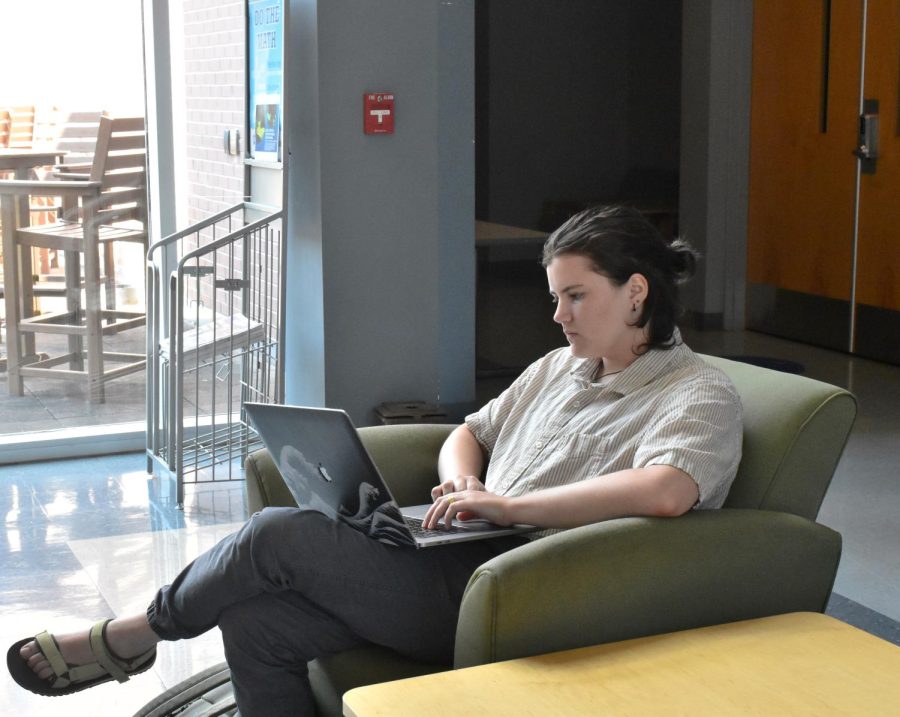Enrollment rates down across colleges
A student studying alone in the lobby of an empty academic building.
Enrollment decrease proves to be an issue among college campuses, making UNC Asheville’s already small numbers smaller.
Kortni Campbell, vice chancellor for Admission and Financial Aid said UNCA saw a decrease in enrollment over the last five years.
“While enrollment has most markedly declined at community colleges, enrollment across all facets of higher ed has seen a drop-off,” she said.
According to the National Student Clearinghouse Research Center, a decrease of 4.1% marks the total enrollment decrease among higher education institutions.
“Dropping enrollment at community colleges definitely impacts our transfer pool,” Campbell said.
She references COVID-19, saying the pandemic impacted enrollment for new and continuing students.
“Many opted to delay, take a break or opt out of their higher education pursuits until they are able to engage in a robust academic and community experience,” Campbell said.
The vice chancellor said even pre-pandemic, the cost of college impacted the willingness and ability of students to pursue a degree.
“The debt burden related to education in the U.S. is real, clearly evidenced by the government’s continued grappling with student loans,” she said.
According to the National Student Clearinghouse Research Center, the value of college and student debt played a hand in enrollment decrease, indicating it could be a while until numbers start to climb again.
Campbell said another concern for all institutions is something called the demographic shift.
“Many call this the demographic cliff in the population of traditional-aged, college-going students and is of concern for all institutions,” she said.
Campbell said students, as well as their families, continue to search for relevance when considering their educational and career options.
“UNC Asheville’s relationship-focused approach to education is relevant now and will continue to be as our students combine the critical thinking, communication and problem-solving skills gained here with their commitment to tackling the challenges we face now and will face in the future,” she said.
Campbell said for the first time in three years, the opportunity to meet with students and their families finally presents itself achievable again.
“The recent investments UNCA received from the state expands our ability to reach out to/engage prospective students, create meaningful scholarship opportunities and to support strong academic and student life programming, which resonates with our students,” she said.
Campbell applauds UNCA students, saying they bring cause for great optimism.
“They have come through challenging times in the last few years and continue to prioritize their learning and growth while advocating for education, growth, change and accountability on a broader scale,” she said.
Regine Criser, director of Student Success & associate professor of languages and literatures, said COVID definitely led prospective students to deeply reflect on why they were going to college.
“Some students have to navigate different kinds of pressures around earning money and supporting their families because of COVID. Of course, COVID has drastically impacted the overall well-being and specifically the mental health of students, which also impacts their decision to enroll and stay enrolled,” she said.
Criser also said factors like proximity to home or the number of online offerings now weigh differently for some students, but saying UNCA remains well prepared to meet the needs of students.
“Not just because of our size but because of the commitment of our faculty and staff to an educational experience that is as excellent as it is inclusive and that balances academic rigor with care for the holistic well-being of our students,” she said.
Criser references the recent launch of the Student Success Hub, the continued commitment of the Academic Success Center and the strong student affair offerings.
Jeff Konz, interim vice provost and director of institutional research, said in the last few years of enrollment decline, trends are evenly distributed.
According to the fall enrollment at glance Konz conducts, the overall headcount at UNCA has decreased by 319 students since last year, leaving us with a 10% decrease of 2,914 students.
“On our campus, relationships and personal connection matters greatly; losing in-person classes was a blow for many of our students because the direct personal relationship they have with faculty just isn’t the same over Zoom,” he said.
Konz said being on campus this year with student presence constitutes a totally different but wonderful energy.
Olivia Kane, a UNCA student studying interdisciplinary studies, arts management and entrepreneurship, said she thinks the enrollment decrease comes from people realizing college doesn’t appeal to everyone.
“More folks are pursuing alternative paths of education like technical schools or spending a few years working and maturing to figure out what exactly they want to go to college for. I think COVID definitely impacted how a lot of people view college and whether or not it is worth it, especially as college gets more expensive every year,” she said.
Kane said although numbers do indicate a decrease of enrollment, she thinks Highsmith feels extra crowded this year, as well as the library.
“I do have friends at other universities that have mentioned things feeling less populated this year though,” she said.
Kane raises the point of COVID again, saying it dramatically affected the college experience.
“Nobody, students or staff, knew how to handle the changes of trying to do everything from home and over Zoom. People got burned out and I think in some ways were forced to do some self-reflection. A lot of people go to college simply because it’s considered the right path after high school; most people don’t even know what they want to study. COVID forced us all to re-examine our priorities and for some, college wasn’t it,” she said.
The student said there is no singular fix to the decrease in enrollment and she’s not sure there should even be one.
“Money is definitely a big reason a lot of folks can’t go to college even if they want to, people just seem busier these days–having to work multiple jobs just to make ends meet,” she said.



















